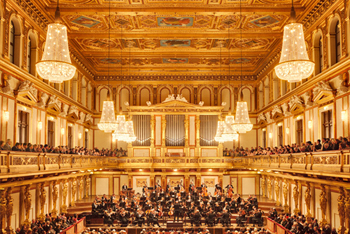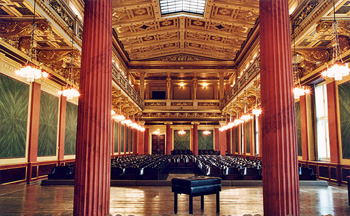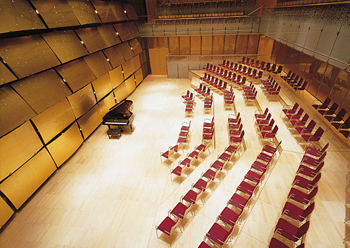Tonkünstler Orchestra of Lower Austria
Mo | Tu | We | Th | Fr | Sa | Su |
Program and cast
SUNDAY, SEPTEMBER 29, 2024 & TUESDAY, OCTOBER 1, 2024
Tonkünstler Orchestra Lower Austria
Yutaka Sado, Conductor
Patrick Hofer, Trumpet
PROGRAM
GEORG FRIEDRICH HAAS
I don’t know how to cry
ALEXANDER ARUTIUNIAN
Concerto for Trumpet and Orchestra
– Intermission –
LUDWIG VAN BEETHOVEN
Symphony No. 3 in E-flat major, Op. 55, "Eroica"
SATURDAY, OCTOBER 12, 2024 & SUNDAY, OCTOBER 13, 2024
Tonkünstler Orchestra Lower Austria
Tabita Berglund, Conductor
Nicolas Altstaedt, Cello
PROGRAM
JEAN SIBELIUS
Pohjola's Daughter. Symphonic Fantasy, Op. 49
WITOLD LUTOSŁAWSKI
Concerto for Cello and Orchestra
– Intermission –
JEAN SIBELIUS
Symphony No. 5 in E-flat major, Op. 82
THURSDAY, OCTOBER 24, 2024
Tonkünstler Orchestra Lower Austria
Gast Waltzing, Conductor
Quentin Collins, Trumpet
Brandon Allen, Saxophone
Kyle Eastwood, Double Bass
Chris Higginbottom, Drums
Andrew McCormack, Piano
PROGRAM
Tribute to Clint Eastwood
FRIDAY, NOVEMBER 15, 2024 & SUNDAY, NOVEMBER 17, 2024
Tonkünstler Orchestra Lower Austria
Fabio Luisi, Conductor
Marie-Ange Nguci, Piano
PROGRAM
WOLFGANG AMADEUS MOZART
Piano Concerto No. 20 in D minor, K. 466
– Intermission –
ANTON BRUCKNER
Symphony No. 9 in D minor
SATURDAY, NOVEMBER 30, 2024 & SUNDAY, DECEMBER 1, 2024
Tonkünstler Orchestra Lower Austria
Jun Märkl, Conductor
Carolin Widmann, Violin
PROGRAM
FRANZ SCHUBERT
Polonaise for Violin and Orchestra in B-flat major, D 580
JÖRG WIDMANN
Concerto for Violin and Orchestra No. 2
– Intermission –
JOHANNES BRAHMS
Symphony No. 2 in D major, Op. 73
SUNDAY, DECEMBER 15, 2024 & WEDNESDAY, DECEMBER 18, 2024
Tonkünstler Orchestra Lower Austria
Konzertchor Interpunkt
Ivor Bolton, Conductor
Chelsea Zurflüh, Soprano
Hugh Cutting, Countertenor
Hugo Hymas, Tenor
David Steffens, Bass
PROGRAM
GEORG FRIEDRICH HÄNDEL
Messiah. Oratorio in three parts, HWV 56
FRIDAY, JANUARY 3, 2025, SATURDAY, JANUARY 4, 2025,
SUNDAY, JANUARY 5, 2025 & TUESDAY, JANUARY 7, 2025
Tonkünstler Orchestra Lower Austria
Sascha Götzel, Conductor
Serena Sáenz, Soprano
Aleksandra Szmyd, Soprano - TUESDAY, JANUARY 7, 2025
PROGRAM
New Year's Concert
FRIDAY, JANUARY 17, 2025 & SUNDAY, JANUARY 19, 2025
Tonkünstler Orchestra Lower Austria
Gabriel Bebeşelea, Conductor
Sayaka Shoji, Violin
PROGRAM
JOHANNES BRAHMS
Violin Concerto in D major, Op. 77
– Intermission –
ANTONÍN DVOŘÁK
Symphony No. 8 in G major, Op. 88
SATURDAY, FEBRUARY 15, 2025 & SUNDAY, FEBRUARY 16, 2025
Tonkünstler Orchestra Lower Austria
Fabien Gabel, Conductor
Simone Lamsma, Violin
PROGRAM
ERICH WOLFGANG KORNGOLD
Tales of Strauss, Op. 2
Violin Concerto in D major, Op. 35
– Intermission –
RICHARD STRAUSS
Suite from the ballet "Whipped Cream", Op. 70
SUNDAY, FEBRUARY 23, 2025 & MONDAY, FEBRUARY 24, 2025
Tonkünstler Orchestra Lower Austria
Jakob Lehmann, Conductor
Kirill Maximov Nezalizov, Violin
Kateryna Diadiura, Piano
PROGRAM
FELIX MENDELSSOHN BARTHOLDY
Concerto for Violin, Piano, and String Orchestra in D minor
– Intermission –
ANTON BRUCKNER
Symphony No. 2 in C minor
WEDNESDAY, FEBRUARY 26, 2025
Tonkünstler Orchestra Lower Austria
Taichi Hiratsuka, Conductor
Albert Hosp, Host
PROGRAM
Do You Love Sibelius?
JEAN SIBELIUS
Symphony No. 5 in E-flat major, Op. 82
TUESDAY, MARCH 4, 2025
Tonkünstler Orchestra Lower Austria
Yutaka Sado, Conductor
Yeol Eum Son, Piano
PROGRAM
JEAN SIBELIUS
Symphony No. 7 in C major, Op. 105
WOLFGANG AMADEUS MOZART
Piano Concerto in C major, KV 467
– Intermission –
JOHANNES BRAHMS
Symphony No. 1 in C minor, Op. 68
SUNDAY, MARCH 23, 2025 & TUESDAY, MARCH 25, 2025
Tonkünstler Orchestra Lower Austria
Yutaka Sado, Conductor
PROGRAM
ANTON BRUCKNER
Symphony No. 5 in B-flat major
TUESDAY, APRIL 1, 2025
Tonkünstler Orchestra Lower Austria
Irene Delgado-Jiménez, Conductor
Albert Hosp, Host
PROGRAM
Do You Love Brahms?
JOHANNES BRAHMS
Hungarian Dance No. 5 in F-sharp minor; orchestrated by Albert Parlow
Hungarian Dance No. 6 in D-flat major; orchestrated by Albert Parlow
Variations on a Theme by Joseph Haydn ("St. Anthony Chorale") for Orchestra in B-flat major, Op. 56a
SATURDAY, APRIL 5, 2025 & SUNDAY, APRIL 6, 2025
Tonkünstler Orchestra Lower Austria
Domingo Hindoyan, Conductor
Simon Trpčeski, Piano
PROGRAM
ROBERTO SIERRA
Symphony No. 6
ALBERTO GINASTERA
"Concierto argentino" for Piano and Orchestra
– Intermission –
ANTONÍN DVOŘÁK
Symphony No. 9 in E minor, Op. 95, "From the New World"
THURSDAY, APRIL 10, 2025
Tonkünstler Orchestra Lower Austria
Keith Lockhardt, Conductor
China Moses, Vocals
PROGRAM
Fever China Mose
SUNDAY, MAY 4, 2025
Tonkünstler Orchestra Lower Austria
Yutaka Sado, Conductor
Kyohei Sorita, Piano
PROGRAM
WOLFGANG AMADEUS MOZART
Piano Concerto in A major, KV 488
– Intermission –
GUSTAV MAHLER
Symphony No. 5
FRIDAY, MAY 23, 2025
Tonkünstler Orchestra Lower Austria
Kodō Ensemble
Yutaka Sado, Conductor
PROGRAM
PEETER VÄHI
Concerto for Taiko Ensemble and Orchestra, "Call of Sacred Drums"
RYOTARO LEO IKENAGA
Inochi
SUNDAY, JUNE 1, 2025,
TUESDAY, JUNE 3, 2025 & WEDNESDAY, JUNE 4, 2025
Tonkünstler Orchestra Lower Austria
Vienna Singverein Choir
Slovak Philharmonic Choir
Vienna Boys' Choir
Yutaka Sado, Conductor
Verity Wingate, Soprano
Jacquelyn Stucker, Soprano
Christina Gansch, Soprano
Štepánka Pucálková, Alto
Noa Beinart, Alto
Maximilian Schmitt, Tenor
Rafael Fingerlos, Baritone
David Steffens, Bass
PROGRAM
GUSTAV MAHLER
Symphony No. 8 in E-flat major, "Symphony of a Thousand"
Musikverein Golden Hall
This building is located on Dumbastraße/Bösendorferstraße behind the Hotel Imperial near the Ringstraße boulevard and the Wien River, between Bösendorferstraße and Karlsplatz. However, since Bösendorferstraße is a relatively small street, the building is better known as being between Karlsplatz and Kärntner Ring (part of Ringstraße loop). It was erected as the new concert hall run by the Gesellschaft der Musikfreunde, on a piece of land provided by Emperor Franz Joseph I of Austria in 1863. The plans were designed by Danish architect Theophil Hansen in the Neoclassical style of an ancient Greek temple, including a concert hall as well as a smaller chamber music hall. The building was inaugurated on 6 January, 1870. A major donor was Nikolaus Dumba whose name the Austrian government gave to one of the streets surrounding the Musikverein.
Great Hall - Golden Hall
 “As high as any expectations could be, they would still be exceeded by the first impression of the hall which displays an architectural beauty and a stylish splendour making it the only one of its kind.” This was the reaction of the press to the opening of the new Musikverein building and the first concert in the Großer Musikvereinssaal on 6 January 1870.
“As high as any expectations could be, they would still be exceeded by the first impression of the hall which displays an architectural beauty and a stylish splendour making it the only one of its kind.” This was the reaction of the press to the opening of the new Musikverein building and the first concert in the Großer Musikvereinssaal on 6 January 1870.
The impression must have been overwhelming – so overwhelming that Vienna’s leading critic, Eduard Hanslick, irritatingly brought up the question of whether this Großer Musikvereinssaal “was not too sparkling and magnificent for a concert hall”. “From all sides spring gold and colours.”
Brahms Hall
 "In order not to promise too much it can be said that it has been made into the most beautiful, most magnificent, perfect example of a chamber concert hall that any of us knows in the world.” This was the reaction of a Vienna daily newspaper in October 1993 as the Brahms-Saal was presented to the public after extensive renovation work.
"In order not to promise too much it can be said that it has been made into the most beautiful, most magnificent, perfect example of a chamber concert hall that any of us knows in the world.” This was the reaction of a Vienna daily newspaper in October 1993 as the Brahms-Saal was presented to the public after extensive renovation work.
The surprise was perfect. It was a completely new hall. In contrast to the Grosse Musikvereinssaal, the Brahms-Saal had changed its appearance quite considerably over the years. When and how it acquired that slightly melancholy duskiness that was known to music lovers before 1993 cannot be precisely documented.
Glass Hall
 As a venue for events from concerts to luxury banquets, the Glass Hall / Magna Auditorium is not only the largest of the Musikverein's 4 new halls but also the most flexible in terms of usage.
As a venue for events from concerts to luxury banquets, the Glass Hall / Magna Auditorium is not only the largest of the Musikverein's 4 new halls but also the most flexible in terms of usage.
Hub podiums enable the smooth transformation of the concert hall into a conference centre, the cinema into a ballroom, or the stage into a catwalk. State-of-the-art equipment for sound, lighting, video and widescreen digital projection provide the ideal conditions for half-scenic productions.
The Glass Hall / Magna Auditorium was designed by the Viennese architect Wilhelm Holzbauer. With a height of 8 metres, the hall (including the gallery) can play host to up to 380 visitors.
Performances: Su 09 Mar 2025,
Performances: Su 24 Nov 2024,
Performances: Sa 27 Jul 2024,
Performances: Mo 09 Dec 2024,
Performances: Fr 21 Mar 2025,
Performances: We 15 Jan 2025,

 EN
EN DE
DE IT
IT FR
FR ES
ES RU
RU JP
JP RO
RO
 Seating plan
Seating plan 









